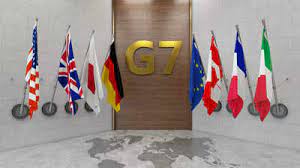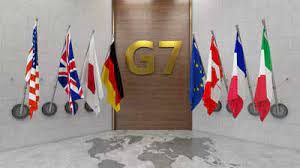
The G7 industrial powers, who were prompted by China to impose import restrictions on Japanese food items after Japan started leaking wastewater from the Fukushima nuclear power plant, demanded on Sunday the "immediate repeal" of such restrictions.
In a statement released following their weekend meeting in Osaka, the G7 trade ministers condemned what they saw as China's increasing use of trade pressure without mentioning the country specifically.
“We deplore actions to weaponize economic dependencies and commit to build on free, fair, and mutually beneficial economic and trade relationships,” said the 10-page statement.
Two months ago, when Japan began releasing treated radioactive water from the destroyed Fukushima plant into the Pacific, China imposed a general ban on Japanese seafood imports. Although the United States and Japan have criticised the restrictions as unjust, Russia earlier this month announced a similar measure.
China responded by calling the G7's action "economic coercion" and advising them to act practically to preserve the regular order of international trade and investment rather than "stubbornly adhere to double standards."
“The G7 members undermine the level playing field and disrupt the security and stability of global production and supply chains,” China’s embassy in Japan said in a statement late on Sunday.
The G7 countries—Canada, the United States, Japan, Germany, Britain, France, and Italy—expressed “concern” over new export restrictions.
The world's largest producer of graphite, China, responded to criticism of its dominance in global manufacturing this month by announcing export restrictions on the essential substance used in batteries for electric vehicles.
According to Japan's commerce minister Yasutoshi Nishimura, the G7 ministers "shared the need, a genuinely strong one, to reduce dependence on a particular country" for the supply of vital resources. He said at a press conference, "We completely agreed to build resilient and reliable supply chains" for vital minerals, semiconductors, and batteries.
According to the statement, the ministers reiterated their worries about "a wide and evolving range of non-market policies," such as forced technology transfer and "pervasive, opaque, and trade-distortive industrial subsidies."
The G7 leaders denounced Russia for its invasion of Ukraine, which destroyed the nation's grain export infrastructure, and for its "unilateral" decision to end negotiations on a deal that would have permitted Ukraine, a major exporter of grains, to ship wheat and other goods over the Black Sea.
The G7 trade ministers merely stated that they “seek to raise awareness about the challenges of moving humanitarian goods across international borders during natural disasters and other emergencies,” omitting to address the Middle East conflict, in contrast to the finance ministers' meeting two weeks ago, which denounced Hamas' “terror attacks” against Israel.
Though there has been growing international concern about the toll from Israel's bombing and growing requests for a pause to allow relief to reach Palestinian people in Gaza, Western governments have mainly supported what they claim is Israel's right to self-defense.
(Source:www.theprint.in)
In a statement released following their weekend meeting in Osaka, the G7 trade ministers condemned what they saw as China's increasing use of trade pressure without mentioning the country specifically.
“We deplore actions to weaponize economic dependencies and commit to build on free, fair, and mutually beneficial economic and trade relationships,” said the 10-page statement.
Two months ago, when Japan began releasing treated radioactive water from the destroyed Fukushima plant into the Pacific, China imposed a general ban on Japanese seafood imports. Although the United States and Japan have criticised the restrictions as unjust, Russia earlier this month announced a similar measure.
China responded by calling the G7's action "economic coercion" and advising them to act practically to preserve the regular order of international trade and investment rather than "stubbornly adhere to double standards."
“The G7 members undermine the level playing field and disrupt the security and stability of global production and supply chains,” China’s embassy in Japan said in a statement late on Sunday.
The G7 countries—Canada, the United States, Japan, Germany, Britain, France, and Italy—expressed “concern” over new export restrictions.
The world's largest producer of graphite, China, responded to criticism of its dominance in global manufacturing this month by announcing export restrictions on the essential substance used in batteries for electric vehicles.
According to Japan's commerce minister Yasutoshi Nishimura, the G7 ministers "shared the need, a genuinely strong one, to reduce dependence on a particular country" for the supply of vital resources. He said at a press conference, "We completely agreed to build resilient and reliable supply chains" for vital minerals, semiconductors, and batteries.
According to the statement, the ministers reiterated their worries about "a wide and evolving range of non-market policies," such as forced technology transfer and "pervasive, opaque, and trade-distortive industrial subsidies."
The G7 leaders denounced Russia for its invasion of Ukraine, which destroyed the nation's grain export infrastructure, and for its "unilateral" decision to end negotiations on a deal that would have permitted Ukraine, a major exporter of grains, to ship wheat and other goods over the Black Sea.
The G7 trade ministers merely stated that they “seek to raise awareness about the challenges of moving humanitarian goods across international borders during natural disasters and other emergencies,” omitting to address the Middle East conflict, in contrast to the finance ministers' meeting two weeks ago, which denounced Hamas' “terror attacks” against Israel.
Though there has been growing international concern about the toll from Israel's bombing and growing requests for a pause to allow relief to reach Palestinian people in Gaza, Western governments have mainly supported what they claim is Israel's right to self-defense.
(Source:www.theprint.in)





